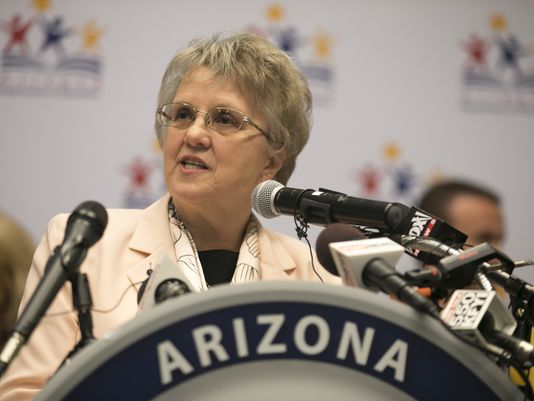Diane Douglas State of Public Education Address

By: Joseph Guzman
Cronkite Special to AZLatinos.com
Superintendent of Public Instruction, Diane Douglas gave her State of Public Education address before the Senate Committee on Thursday, saying she is hopeful yet cautiously skeptical.
“For education, It is too early to tell if we are only spending enough money to settle a lawsuit, temporarily vacate the public, remain a system with inadequate funding, federal interference, and over regulation,” Douglas said.
“Or, are we seriously taking the first steps to building the best education system in the nation?”
Douglas said she and the legislature have advanced plans to improve funding for classrooms, parental rights, and solving funding litigation.
The superintendent said her program “Arizona Kids Can’t Afford To Wait” (that began in 2015) will bring Arizona one step closer to having the best education system in the country; and shows great promise for improving the education system in Arizona.
“’Arizona Kids Can’t Afford to Wait’ turns voter feedback into actual goal proposals for Arizona’s education system,” Douglas said.
The framework for the action plan came from Douglas’s tours of communities across Arizona with the purpose of allowing citizens to express concerns about the state of their local education systems.
“The thoughts of those we serve must meaningfully impact the work that we do each day, and I am proud to say that ‘Arizona Kids Can’t Afford to Wait’ embodies that philosophy,” Douglas said.
Douglas said the message from voters is clear: more funding for teachers and a reduction in classroom size, citing additional funding to compensate for the teacher shortage in the state.
Along with Proposition 123, Gov. Doug Ducey’s $3.5 billion education fund, and the education reform plan she introduced last year, Douglas said it is the beginning of Arizona’s move to a higher national education rank.
Arizona voters will vote in May for Proposition 123.
Douglas also made reference to her success of cutting Arizona’s ties to the common core system. She claimed it to be a victory saying it returns control of the educational standards back to the teachers and parents.
The superintendent said she plans to reduce administrative cost and increase classroom resources by introducing legislation to do away with outdated and restrictive regulation.
Sen. Steve Smith agreed with Douglas’s point to increase funding for underpaid teachers.
“I’m glad to see a lot of your comments are in line with some of my interests,” Smith said.
“A performance pay bill for teachers by rewarding them for what they are doing is something I have been working on for years. I am glad that is a priority, as it is mine,” Smith said.
Not all senators agreed with what Douglas presented to the committee. Sen. Kimberly Yee expressed some concern about legislation the superintendent’s plans to try to pass through the legislature.
“I have some concerns about some of the issues you spoke about, you spoke about parental involvement, yet house bill 2189 is removing parental involvement statutes that make sure parents are involved in the aspect of the school,” Yee said.
Douglas replied by citing a secondary bill she proposed which she says is still being worked out.
“I believe that bill you are referring to is one that requires more rigorous debate,” Douglas said.














